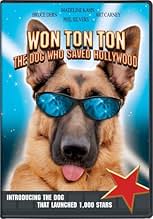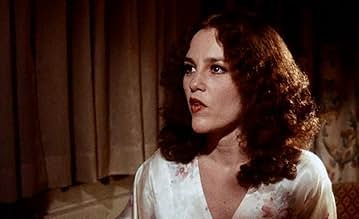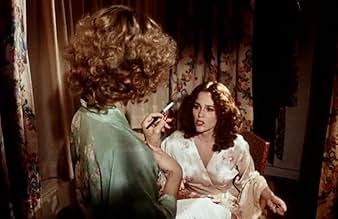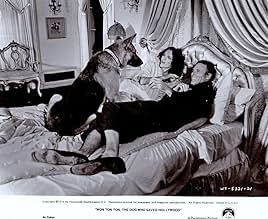Agrega una trama en tu idiomaIn 1924, Estie comes to Hollywood to become an actress but the dog that followed her becomes the star. Hollywood has its own rules of success.In 1924, Estie comes to Hollywood to become an actress but the dog that followed her becomes the star. Hollywood has its own rules of success.In 1924, Estie comes to Hollywood to become an actress but the dog that followed her becomes the star. Hollywood has its own rules of success.
William 'Billy' Benedict
- Man on Bus
- (as William Benedict)
- Dirección
- Guionistas
- Todo el elenco y el equipo
- Producción, taquilla y más en IMDbPro
Argumento
¿Sabías que…?
- TriviaEighty-year-old Edward Le Veque, who appeared as the prostitute's customer, was the last surviving member of the original Keystone Kops.
- ErroresThe Bruce Dern character is constantly presenting story ideas to Hollywood moguls which they reject as being ridiculous and not commercial - although these plot ideas are in fact the basic story-lines of famous real films of a more recent date, such as "Jaws" and "The Exorcist". One such plot, however, is the basic story of "The Wizard of Oz" - which is taken from one of the most famous works of American children's literature, published first in 1902, and the basis for a popular silent film which would have appeared only a short time before the period of this film. Presumably, no-one connected with "Won Ton Ton" knew about the book or the silent film.
- Citas
Estie Del Ruth: Success is nothing without the dog you love to share it with.
- ConexionesFeatured in David Walliams' Awfully Good: Awfully Good Movies (2011)
- Bandas sonorasParamount on Parade
Written by Jack King (as J. King) and Elsie Janis (as E. Janis)
Opinión destacada
What can you say about a film that feels like a graduation exercise by the B-grade film students out of UCLA? "A, for effort." Now, not to get too side tracked here, but if SF State Students had done this film, it would have been all artsy and existential, but I digress.
"Won Ton Ton" is a nod to old Hollywood, and sends up the old classic system before the Golden Age of Hollywood. This was the period when visual gags and formulations that we see in today's films were forged and put on the screen for the first time for all to see. Pretty starlets in chorus lines, stage hands pretending to be big shots to take advantage of pretty young ladies, double dealing and creative bookeeping tinsel-town style, movie moguls and classic vaudeville actors are all showcased here.
One is hard pressed to malign the film, but let's face it, it's got charm but also some issues. The thing that somewhat torpedoes this film is the post production. The sound is raw. It's all scratch track (or mostly), and it gives the film a kind of amateurish family film feel, which makes it hard to accept the visual cues and other gags the movie trying to convey. There's some looped sounds, but one wonders why the post isn't a bit more refined.
For all that it's actually quite an endearing film. Certainly not the best, but definitely a charmer. A lot of classic faces from the 50s and 60s make cameos, and the lines they deliver are good, but the film is somewhat misdirected, and Bruce Dern (as good an actor as he is) seems somewhat odd for the role.
The film, as much work was put into this thing, seems a little on the low budget side. Still, after having viewing it after 30+ years later, I can still warm up to it some. It's really a film for industry insiders with as flare for their own history..
Then, there's the dog (or series of dogs used for the lead). This film and a few other shows popularized the German Shepard, and we see here the showcasing and capitalization of the Bavarian hound. Well, they say never work with children or animals, but Won Ton Ton holds its own in a low budget off-beat homage sort of way.
If you're a real Hollywood aficionado, then this film might satisfy. Otherwise maybe see it once, and then pass it off to a friend. :-)
"Won Ton Ton" is a nod to old Hollywood, and sends up the old classic system before the Golden Age of Hollywood. This was the period when visual gags and formulations that we see in today's films were forged and put on the screen for the first time for all to see. Pretty starlets in chorus lines, stage hands pretending to be big shots to take advantage of pretty young ladies, double dealing and creative bookeeping tinsel-town style, movie moguls and classic vaudeville actors are all showcased here.
One is hard pressed to malign the film, but let's face it, it's got charm but also some issues. The thing that somewhat torpedoes this film is the post production. The sound is raw. It's all scratch track (or mostly), and it gives the film a kind of amateurish family film feel, which makes it hard to accept the visual cues and other gags the movie trying to convey. There's some looped sounds, but one wonders why the post isn't a bit more refined.
For all that it's actually quite an endearing film. Certainly not the best, but definitely a charmer. A lot of classic faces from the 50s and 60s make cameos, and the lines they deliver are good, but the film is somewhat misdirected, and Bruce Dern (as good an actor as he is) seems somewhat odd for the role.
The film, as much work was put into this thing, seems a little on the low budget side. Still, after having viewing it after 30+ years later, I can still warm up to it some. It's really a film for industry insiders with as flare for their own history..
Then, there's the dog (or series of dogs used for the lead). This film and a few other shows popularized the German Shepard, and we see here the showcasing and capitalization of the Bavarian hound. Well, they say never work with children or animals, but Won Ton Ton holds its own in a low budget off-beat homage sort of way.
If you're a real Hollywood aficionado, then this film might satisfy. Otherwise maybe see it once, and then pass it off to a friend. :-)
- Blueghost
- 29 dic 2010
- Enlace permanente
Selecciones populares
Inicia sesión para calificar y agrega a la lista de videos para obtener recomendaciones personalizadas
- How long is Won Ton Ton: The Dog Who Saved Hollywood?Con tecnología de Alexa
Detalles
- Fecha de lanzamiento
- País de origen
- Idioma
- También se conoce como
- Won Ton Ton, the Dog Who Saved Hollywood
- Locaciones de filmación
- California, Estados Unidos(locations: Los Angeles County and Santa Barbara County)
- Productora
- Ver más créditos de la compañía en IMDbPro
Taquilla
- Presupuesto
- USD 4,000,000 (estimado)
- Tiempo de ejecución1 hora 32 minutos
- Mezcla de sonido
- Relación de aspecto
- 1.85 : 1
Contribuir a esta página
Sugiere una edición o agrega el contenido que falta

Principales brechas de datos
By what name was Won Ton Ton: The Dog Who Saved Hollywood (1976) officially released in India in English?
Responda


























